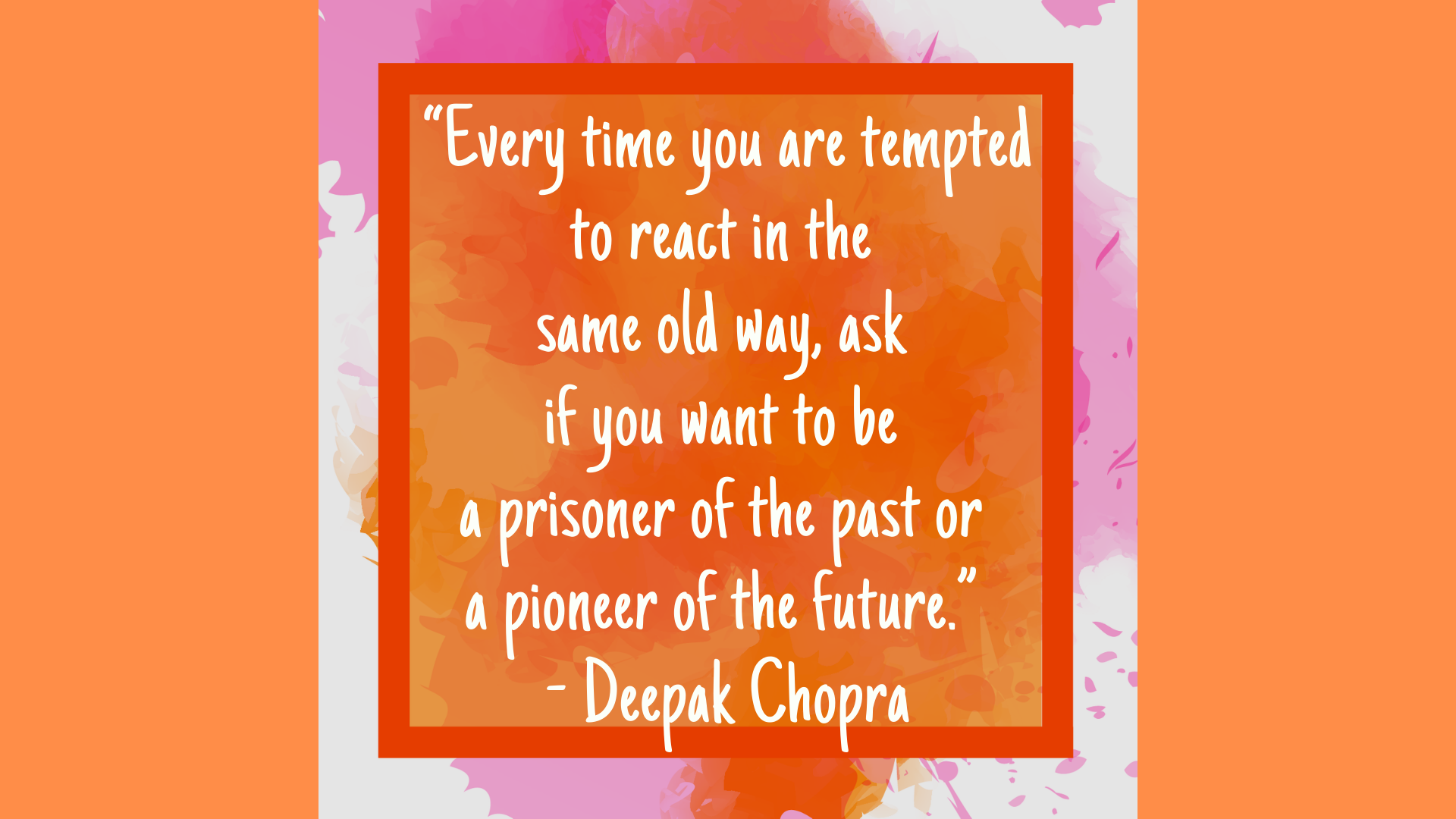Kay:
Hey, hey, Questers, and welcome back. Happy Mindful, Monday. It is May 3rd, and this is episode 346. We have a Deepak Chopra quote for you today, and he says, “Every time you are tempted to react in the same old way, ask if you want to be a prisoner of the past or a pioneer of the future.”

Shi:
It’s a beautiful turn of phrase and articulation of such a deep spiritual principle and neuroscience. It’s a scientific fact about how we can change our behavior by being able to interrupt patterns. If we continue to just react in the same old way, as Deepak tells us here, then we’ll continue to get the same results and the same frustrations and the same problems. So, we have to have this ultimate perspective shift in order to be more spiritual, to use those scientific facts to change our behavior, and to hopefully build an internal experience that we enjoy.
Kay:
Well, being a pioneer means that you’re trying brand new things. You’re doing things that have maybe never been done before, either by you or somebody that you know, or other people. Even if it’s just outside of your own comfort zone, you are pioneering past that level of comfort and into the future. Sometimes being a prisoner of your same old circumstances is a little bit sneakier than it might seem. This can sometimes manifest as you becoming “comfortable” or as having a circumstance that just never seems to change. Now, this is when you start to maybe hear yourself say things like, well, it just never gets any better, or I just don’t understand how to change this portion of my life. Now, if those are some phrases that you’ve used. You might actually be a prisoner of your past.
Shi:
I think about every time you attempted to react in the same old way. So, think about all of the times in your life that this happens to you, that you get drawn into the drama, the reality, the situation, the circumstance, the embarrassment, the seriousness of the issue. We get drawn into that and it starts to trigger those patterns of reaction for us. Some of them we’re not often proud of. So, if I think about myself, there are certain patterns with the kids. They’ll start to just nag or they’re running around and they’re being really loud and they’re knocking their shoes on whatever it is. You can feel that temptation. I’m glad that he uses that word, to be pulled towards that way that you always react, which is snap because that’s what gets the result and keeps going. Then you feel bad about it later. So, being able to, at that moment, have this question to yourself, do I want to be a prisoner of the past or a pioneer of the future I think is really helpful.
Kay:
What I like about this is that Deepak is giving us a tool. He’s giving us pattern interrupt. Shila said, this is a neuroscience tactic, and it absolutely is when you are exhibiting the same old pattern. Sometimes you can have something. Some people like to have the rubber band around the wrist that they snap. That’s a little physically aggressive for me. For a long time, Shila and I did like a leg kick. We were just trying to break the thinking pattern so that we knew that the other person had something inside that wasn’t constructive. So, this is a really good way for you to maybe if you’re stuck or asking yourself those unconstructive questions that you can give yourself this question that Deepak says, which is, “Do you want to be this prisoner of the past or a pioneer of the future,” and take that stock in the moment, give yourself the pattern interrupt and maybe to something that’s a little more constructive.
Shi:
I like the imagery of prisoners of the past because the past has already happened. It is set. Now, we can change how we feel about past situations and maybe kind of rewire our brain to not have traumatic reactions and responses to certain memories or the habits of thinking. But a prisoner is stuck in a box, right? It’s that material foundation that’s a barrier between the known and the unknown if we take it that way. So, you are a prisoner of the passive if you react that way every time. But that pioneer of the future, bringing it back to what you were saying, like, what is a pioneer in that future is the unknown. A pioneer has to go out there and has to bear the conditions and weather the storms and encounter some. Of course, that can make you want to run back home and continue to be a prisoner of what’s already known.
Kay:
Into the…
Kay & Shi:
Unknown!
Shi:
Frozen II reference there for you.
Kay:
Yes, well, something kind of occurred to me really quick. So, if you’re listening, play along with us really fast. But if I were to ask you, show me what a pioneer looks like? What are you going to do? If you’re going to act out pioneer, what do you do?
Shi:
Hand upon your eyes looking around.
Kay:
There you go.
Shi:
Looking at the horizon.
Kay:
I did not prompt Shila for that.
Shi:
No, we just both did it.
Kay:
She did the exact emotion that I did. So, if you have done the same thing. You put your hand to your head. You’re looking around at that horizon. You’re seeing further, you can see more than you did before. You’re in this exploratory sense of novelty and adventure. That’s where you want to be living your life. That exploratory sense of novel and adventure, not the shackles of the fear of your past.
Shi:
My guess is that many of you are already well-accomplished pioneers of the future and we are happy to preach to the choir today. This amazing Deepak Chopra quote for you. “Every time you are tempted to react in the same old way, ask if you want to be a prisoner of the past or a pioneer of the future.”
Kay:
Alrighty, gang, it is Mindful Monday. So, you all have a Mindful Monday Quest. Today we want you to mind your mind throughout your interactions and your reactions throughout the day. What state of mind isn’t serving you, anger, anxiety, (whatever it might be), we want you to challenge yourself to avoid reacting in the way you might have maybe negatively in the past and attempt to lead with love in your life instead. Are you ready?
Kay & Shi:
Let’s quest!




